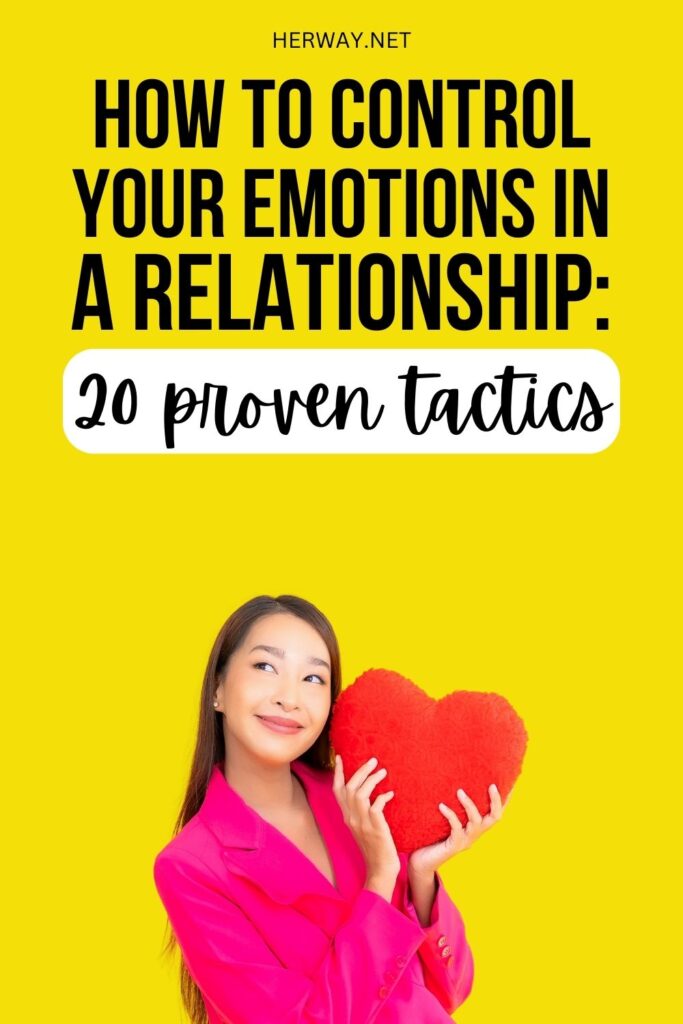How To Control Your Emotions In A Relationship: 20 Proven Tactics
When you become an adult, everyone expects you to magically learn how to control your emotions in a relationship. Well, isn’t it time we all admit we have no clue how it’s done?
I know I saw taking charge of my feelings like mission impossible. It took me a while before I mastered it, and now, here I am, sharing my wisdom with you.
How To Control Your Emotions In A Relationship
Follow this step-by-step guide to regain control of your emotions:
1. Identify your emotions

You can’t expect to learn how to control your emotions if you haven’t reached a stage where you can identify them in the first place. Repressing your emotions might seem like the easier way to go, but trust me – in the long run, it will only cause you trouble.
That is why the first step of this process requires you to be honest with yourself. A lot of people have a habit of, for example, claiming to be angry when they’re actually sad.
This practice is not beneficial for your mental health. Instead, be brave enough to look all of your negative emotions in the eyes, and face them like an adult.
2. Find your triggers
We all have negative thoughts and emotions. But the key to emotional intelligence is to know yourself well enough to get to the bottom of your triggers.
What is the behavioral pattern in your relationship that makes you feel bad? What are the things that provoke you the most? And most importantly, why?
Let’s say that your significant other doesn’t reply to your text. That is your trigger, and it makes you feel bad.
But why do you feel that way? Does it hurt your ego? Do you feel emotionally neglected?
Does this behavior trigger your abandonment issues? Do you have trust issues that make you believe they’re texting someone else?
3. Don’t judge yourself

When you’re trying to figure out how to control your emotions in a relationship in a healthy way, you must forget about self-judgment. You shouldn’t feel ashamed for feeling a certain emotion.
Who says that a certain feeling isn’t appropriate? Who says that you’re not allowed to feel that way? Your emotional state is your business alone, and you should accept and embrace all of your emotions.
4. Try being as realistic as possible
One of the hardest things is to observe your love life from a realistic point of view. After all, you’re involved with it, and sometimes it’s impossible to be objective.
However, for the sake of your mental well-being, you have to try and take a step back. Forget about the infatuation, the anger, true love, resentment, grudges… Actually, try forgetting about all of your emotions completely.
Instead, observe your relationship as an outsider. Imagine that a close friend has come to you with this exact problem.
What would you tell them? Well, apply that same piece of advice to yourself!
5. Observe your partner’s emotions
In the same way you focus on your feelings, if you want a healthy relationship, you should also observe your partner’s emotions.
You two are a team, and your reactions are usually connected. Does your significant other have trouble controlling their emotions, as well?
Is it possible that you trigger each other’s negative thoughts and emotions? In that case, you don’t have a healthy relationship, and that’s something you should work on before anything else.
6. Remember that you’re in charge

Whatever happens, you must keep one thing in mind: you’re in control here! Even when it appears like things are falling apart, you’re the one holding the steering wheel.
Your emotions don’t control you – you’re in charge of them. You’re the combination of your heart and mind, and it’s your job to find balance between the two.
What’s even worse than allowing your emotions to take control over you is allowing someone else to be in charge of your feelings and entire well-being. You should never get yourself into a situation where your entire mood depends on another person.
I don’t care if we’re talking about true love here – your partner shouldn’t have that kind of power over you. You’re not their puppet, and they shouldn’t be pulling the strings!
7. Surround yourself with positivity
Stay away from negative people, and you’ll stay away from negative emotions as well. I don’t care if these toxic people are your closest friends or family members – if they’re bringing negativity into your life, ditch them.
What if you’re surrounded by negativity in a place you can’t escape from, for example, at work? Well, if you can’t find another job, at least compensate for that negativity with as much positivity as you can. In the meantime, please try looking for a new job because your mental health should come first!
Why not try taking a break from social media? You spend all of your days scrolling through other people’s fake posts and fake love lives.
So naturally, you assume that you have it worse. Everyone’s partner treats them better – they get more expensive gifts, and they are intimate all the time.
On the other hand, your relationship looks like a wreck compared to theirs. Consequently, you become overwhelmed with negative emotions you can’t control.
8. Stop overthinking and worrying too much
How to control your emotions in a relationship: Well, start with your thoughts.
As long as you dissect everything your partner says or does, you’ll be overwhelmed with negativity. Trust me, overthinking and worrying too much are your biggest enemies.
Don’t get me wrong – this doesn’t mean that you should just go with the flow. You’re still in charge of your life, and thinking your decisions through is the mature thing to do.
However, you don’t have to analyze every little thing that happens in your relationship. Most importantly, you don’t need to assume that there will always be the worst possible outcome.
Yes, you should take control of your emotions. However, you should be aware that you can’t have full control over everything that happens to you. That’s why you have to stop overthinking in your relationship.
Some things are meant to be, and you thinking about them and worrying yourself sick won’t prevent them from happening. So, why not sit back and enjoy your life instead of ruining it?
9. Healthy communication

You can’t have a healthy relationship without healthy communication. And you can’t hope to figure out how to control your emotions in a relationship if it isn’t healthy.
I mean, it’s completely natural that you’ll be angry, frustrated, and unhappy all the time if you and your partner fight every day. Don’t get me wrong – I’m not saying that there won’t be any arguments in your relationship.
However, mutual respect must exist even when you two fight. Practice talking slowly and calmly without raising your voice. If needed, count to ten before you say something in the midst of an argument.
But that’s not the entire point of healthy communication. You both have to learn how to verbalize your feelings correctly, without the fear of judgment.
Body language communication
Another important aspect of healthy communication is body language communication. If you and your partner display aggressive or avoidant body language, you’ll have a hard time controlling your negative emotions.
10. Find the source of your negative emotions
We’ve already discussed the fact that you should stay away from whatever triggers your negativity. But it’s time to look at something else, as well: the source of your negative thoughts and emotions.
The way to practice emotional intelligence is to understand why you feel the way you do. Dwell deep inside yourself and try figuring out where these negative feelings are coming from. I bet they’ve piled up for a reason.
How were you treated in childhood? What is your attachment style? Do you carry some emotional baggage from a previous relationship?
These questions might not appear related to your current romance, but trust me, the answers to them are crucial.
11. Ask for professional help
If you find it impossible to take control of your emotions, maybe it’s time to ask for professional help. Don’t get me wrong, I’m not trying to diagnose you, but there are several personality disorders and mental health conditions that might prevent you from taking charge of your feelings.
If you worry that you suffer from a certain mental health condition or just feel that your emotions are too much for you to handle, go see a mental health professional. An expert will diagnose you and, most importantly, show you the way throughout this journey.
Even if you have a personality disorder or suffer from something else, it’s not the end of the world. It definitely doesn’t make you crazy.
On the contrary, addressing your problems in time and asking for professional help is a mature and brave thing to do!
12. Engage in self-care

Self-love, self-respect, and self-care are key to keeping yourself sane and mentally healthy. All of these things combined increase your self-esteem and will make you feel much better about yourself in a relationship.
You have to be aware of one thing: the romance you’re currently in is not the most important relationship in your life. In fact, the one you have with yourself is.
If you master the art of self-love, your partner will have no choice but to follow your lead. You’re showing them by example that there is a certain standard you’re willing to settle for and that anything less is unacceptable.
The same goes for self-respect. The more you respect yourself, the more respected you’ll feel in your relationship. Consequently, there will be way fewer negative feelings to deal with.
Self-care is also an important part of this journey. You have to learn how to spoil yourself. When you learn how to treat yourself like someone you love, your mood won’t be affected by anyone’s actions.
13. Self-help methods
When you’re trying to figure out how to control your emotions, you have to learn how to deal with their consequences as well. What should you do when a negative feeling gets the best of you? How do you stop the process and help yourself?
You know exactly what I’m talking about – you feel anger, hatred, or sadness taking over. You’ve reached the level of emotional intelligence to recognize the signs that they’re there, but now, you need the tools to overcome them and calm yourself down.
The best and simplest method is to take deep breaths. This will slow down your heartrate, and it will help you think clearly.
If possible, remove yourself from the situation. Tell your partner that you need some time off and that you’ll finish your discussion after you calm down.
Finally, if you’re really not feeling well, try accessing a mental health resource, such as a hotline in your area, or even call your therapist.
14. Stay in the present
Many people have a hard time remaining in the present moment, especially when it comes to romantic relationships. Even if everything is going great now, you can’t stop thinking about that argument you and your significant other had a few weeks ago.
Or you keep worrying about the future. Where is this relationship going? Do you two have a future together? Will you end up spending the rest of your lives with one another?
What if your SO leaves you? What if they fall in love with someone else? How could you get through life without them?
The list of these questions is endless, but I’m sure you get the point. At the end of the day, you’re consumed by negative feelings that have nothing to do with the present moment.
Instead of enjoying what you have now, you spend most of your time stressing out over potential scenarios or certain things that should have been left in the past.
15. Practice gratitude

If you’re wondering how to control your emotions in a relationship, the answer is to focus on positive emotions. Easier said than done, I know.
Well, why not try practicing gratitude for a change? Instead of paying all of your attention to the things that are lacking in your relationship, look at the ones you have.
Can’t think of anything? Start writing a gratitude journal.
Every night before you go to bed, write down everything good that happened between you and your partner that day. But make sure you don’t take anything for granted.
Write down things such as: “We shared a passionate kiss,” “They sent me a good morning text.”, “They hugged me.”, “They made me laugh.”, “They helped me bring in the groceries.” and so on.
This way, you’ll go to sleep with a smile on your face, filled with positive emotions. Not only that: the next time you are overwhelmed with negative feelings, just open your gratitude journal and start reading. All of a sudden, you’ll realize there is not so much to worry about.
16. No assumptions
A wise man once said that assumptions are the termites of relationships. Don’t overestimate yourself by thinking of yourself as a mind reader.
Trust me, you have no clue what is going on in your partner’s head. There is absolutely no need for you to worry about them leaving you just because you assume that is going to happen.
Don’t stress yourself out about your partner allegedly being angry if they hadn’t specifically told you that was how they felt.
And it works the other way around as well. Never think that they can assume how you feel – you must verbalize your emotions and be direct. It’s the only way to protect them!
17. Find a support system
If you still have trouble figuring out how to control your emotions in a relationship, talk to someone you trust besides your partner. Turn to a close friend or family member and talk to them about your emotions.
Even though your loved ones are not mental health experts, they know you to the bottom of your heart. They might help you process or understand your emotions. Maybe they’ve been through a similar situation or dealt with some mental health issues that made them feel like they’re losing control.
If nothing else, they’ll hear you out and give you a shoulder to cry on – which is sometimes more than enough.
18. Be open about it

However, the most important person you should talk to about this problem is your partner. Even if you’re dealing with a certain mental health condition or a personality disorder that causes your mood swings, it is something your significant other should be familiar with.
Talk to them about your triggers, so they can help you avoid the ones that affect you most.
No, this doesn’t mean that you’re asking them to treat you like a porcelain doll. But they should know what you’re struggling against.
And if they love you enough, they won’t let you go through this alone. They’ll hold your hand and help you learn how to control your emotions in a relationship.
19. The art of forgiveness
Remember how we talked about there being no point in looking back to the past? Well, for that to be possible, you have to learn how to forgive your partner.
If you two overcome some things and if your relationship has survived some obstacles, why are you still holding grudges? Resentment is one of the most powerful negative emotions, and you have to get rid of it before it eats you alive.
I won’t lie to you: forgiving isn’t always easy. In fact, sometimes it’s the hardest thing you have to do. However, you’ll feel liberated once you achieve it.
20. Get a life
Okay, this might sound harsh, but you’ll never learn how to control your emotions in a relationship until you stop being emotionally dependent on your partner. As long as they’re the only person who can control your mood swings, I’m sorry to say, but you’re doomed.
It’s great that you’re so invested in your relationship. However, it doesn’t mean your entire world should revolve around it.
Simply put, get a life outside of your romance. Hang out with friends, find some hobbies, and most importantly, work on yourself.
To Wrap Up:
Once you learn how to control your emotions in a relationship, you’ll reach a level of emotional intelligence you didn’t even know existed. These skills will help in all other fields of your life and in all the other relationships you have.
Most importantly, it will help improve your mental health, and there is nothing more important than that!








